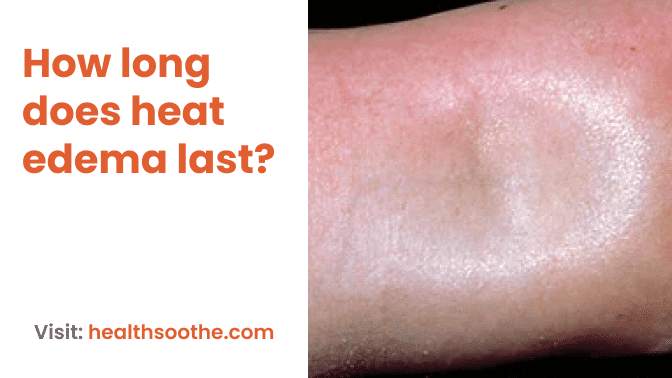The medical word for swelling that develops when extra fluids get entrapped in the bodily tissues is edema. Any area of the body may experience edema or swelling, which can have a variety of reasons.
The most often impacted areas by edema are the hands, legs, ankles, arms, and feet. Edema may affect anybody, although it is more common in pregnant women and elderly persons.
What Are the Different Types of Edema?
- Any organ in the body may experience edema or swelling as a result of the buildup of fluids. The following is a list of the several edema types:
- Peripheral Edema – The legs, feet, and ankles are the major areas where peripheral edoema is present. It often indicates a problem with the cardiovascular system, kidneys, or lymph nodes.
- Pedal edema is a condition in which fluid builds up in the foot and lower legs. Females who are pregnant are more prone to develop pedal edema, which makes it challenging for them to move the swollen area.
- Pulmonary Edema – The buildup of fluid around the lungs causes pulmonary edema. The patient complains of breathing problems, an erratic pulse, coughing, and suffocating.
- Fluid builds up in the brain in a disease known as cerebral edema. It may occur as a result of a brain tumour, blood artery obstruction, or a head accident.
- Macular Edema – A disease known as macular edema occurs when fluid seeps into the macula. The area of the eye called the macula is in charge of colour perception. When the retinal blood vessels are damaged, macular edema develops.
- Lymphedema – Lymph nodes are tissues found all throughout the body that aid in the body’s ability to fight infections. Lymphedema, a disorder marked by swelling of the arms and legs, results from injury to these lymph nodes.
What Is the Meaning of the Term Heat Edema?
Heat edema is the medical term for swelling or edoema that results from prolonged exposure to heat. Summertime brings with it high outdoor temperatures and a love of beachgoing, yet people often overlook the dangers of overheating.
The blood vessels enlarge as a result of the temperature increase. Edema or swelling occurs as a consequence of the fluid leaking out and being trapped under the skin.
How Is Heat Edema Caused?
In hot weather, the body employs the peripheral vasodilatation process to maintain a normal body temperature. In order to improve the blood supply to the lower extremities, a process known as vasodilatation causes the blood vessels to enlarge or open.
In addition, when it’s hot outdoors, perspiration causes the skin to lose a lot of water.
The body’s microscopic capillaries leak fluid into the space between cells as the blood flow to the organs rises; ordinarily, the lymph nodes drain this fluid from the body. But when there is too much fluid and the lymph nodes can’t get rid of it, a problem develops.
Heat edema is the outcome of the fluid beginning to build up in various body parts, such as the hands, legs, arms, and ankles.
What Factors Increase the Risk of Heat Edema?
The following is a list of the risk factors for heat edema:
- Insufficient acclimatisation Heat edema is more prevalent in those who are not used to or have not spent much time in hot climates. It is a result of their body’s inability to withstand even very low heat levels. The lack of acclimation is what is meant by this.
- People with congestive heart failure or other cardiac conditions are more susceptible to developing heat edema. It’s because the heart can’t pump blood effectively. The swelling or edema that results from the blood flowing back to the legs, feet, and ankles is the outcome.
- High blood sugar levels or diabetes increase the risk of heat edema. It happens as a consequence of the tiny blood arteries being damaged by high glucose levels, which reduces blood flow. The fluid builds up in the body’s organs when the blood flow is disrupted. This is process of high blood sugar levels.
- Diseases of the Kidneys: The kidneys are the urogenital tract’s most important organs. They have tiny structures called nephrons, which filter blood and produce urine.
- The vital minerals and electrolytes must be reabsorbed from the blood by the kidneys. The kidneys’ job is to keep the body’s fluid levels stable and remove extra fluid. However, when the kidneys are unable to perform their functions, fluids build up in the body and cause swelling in various body parts.
- Pregnancy – Because they are more likely to experience heat edema during the summer, pregnant women should stay inside. The risk of edema increases during pregnancy because the body retains more fluids than it would under normal circumstances.
- Prolonged Standing – The patient is more likely to develop heat edema if he stands or sits for an extended period of time in hot weather. It happens because the legs’ veins weaken and water builds up in the feet as a result of gravity, causing edema.
Medication – The risk of edema is increased by the following drugs:
- Antihypertensive drugs.
- Nonsteroidal anti-inflammatory drugs (NSAIDs).
- Steroids.
- Estrogen.
- Antidiabetic drugs.
What Are the Signs and Symptoms of Heat Edema?
People who spend a lot of time in the sun or who spend a lot of time outdoors in the summer are more likely to get heat edema. Below is a list of heat edema’s warning signs and symptoms:
- Swelling or puffiness in one or both arms or legs.
- The skin appears stretched and shiny.
- When the swelling is pressed, it leaves a dent or a dimple, known as pitting edema.
- Increased abdominal size.
- It becomes difficult to move the part that is swollen. For example, patients might experience walking difficulties if their legs are swollen.
- Sometimes, the edema is accompanied by pain in the affected body part.
Conclusion:
The swelling brought on by prolonged exposure to high temperatures, known as heat edema, often goes away after some time. However, the following techniques will support your content research.





